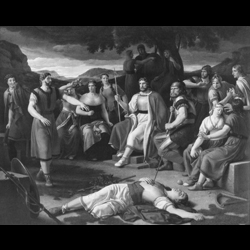
“Dauði Baldrs ins Góða” was commissioned by a Swiss radio station in late 2006 and was first broadcasted in April 2007. The sole imperative was to be inspired by the famous theme of the third movement – titled Marche funèbre – from Frédéric Chopin’s Piano Sonata No. 2. This theme has become one of the two major archetypal evocations of death in Western classical music and was already exploited by metal bands like Bathory, Candlemass, Carnivore and The Great Kat. Therefore, we wanted to offer a short funeral doom version related to the burial of the Norse god Baldr, according to the detailed narrative of the 13th-century Icelandic author Snorri Sturluson in his Gylfaginning and the sparse information provided by the Eddic poem Völuspá, “The Prophecy of the Seeress”.
Baldr, son of Óðinn and Frigg, is a fair god “so bright that light shines from him”; despite his near invulnerability like the Greek hero Achilles, he was however killed by his blind brother Höðr guided by the divine troublemaker Loki. It is a significant event in the eschatological process which will result in the destruction of the leading gods at Ragnarök – or Ragnarøk(k)r. According to Snorri and Völuspá, after that event, Baldr will come back from Hel – the place of the ordinary dead – in a renewed world. Besides the fact that for hard polytheists gods are real beings, there are various interpretations among scholars about the profound meaning of the myth of Baldr’s death, from the re-awakening of a vegetation god to a shamanic initiation rite. An interesting explanation is suggested by Claude Lecouteux, who writes: “Baldr corresponds with an archetype of an ideal being whose innocence is intolerable to a world that knows itself as imperfect and blameworthy.”
“He washed not his hands
Nor combed he his hair
Until he brought to the pyre
The killer of Baldr’s spirit.
And Frigg wept
In the Moist Halls
For the woe of Valhöll.
Do you understand now, or what?”
Völuspá Konungsbókar 33, English translation by Maria Kvilhaug, The Poetic Edda – Six Cosmology Poems.
“Dauði Baldrs ins Góða” is dedicated to Baldr and Nanna. The track was included in the rare audio tape bootleg Life is Nothing! released by Bougies Records in 2009. Recorded, mixed and mastered at Dark Sound Studio, 2006-2007. Music by Scorh/Chopin, words by Scorh, 2006-2007. Music video and photos of Norway by S3th, 2018. Paintings used in the music video: Balders Død (1817) by Christoffer Wilhelm Eckersberg and Balders Død (1779) by Peter Cramer.
Mordor were at the time of this recording: Scorh Anyroth – voices, guitars, machines, sounds; Dam Gomhory – bass, additional percussion, sounds.
